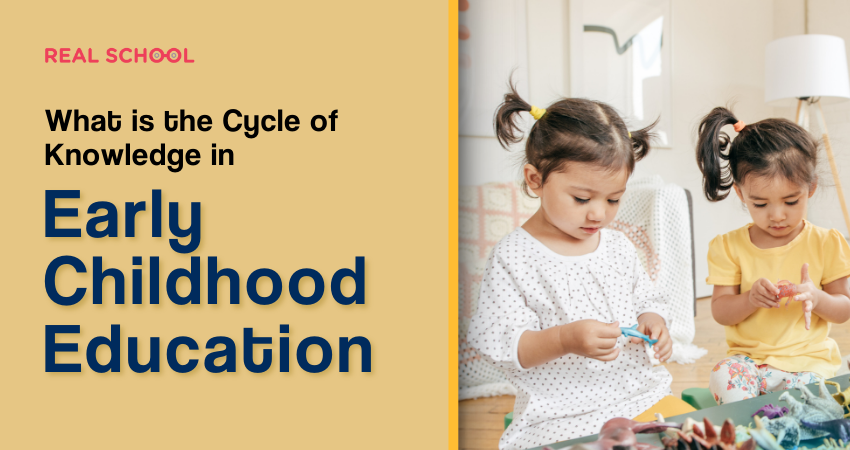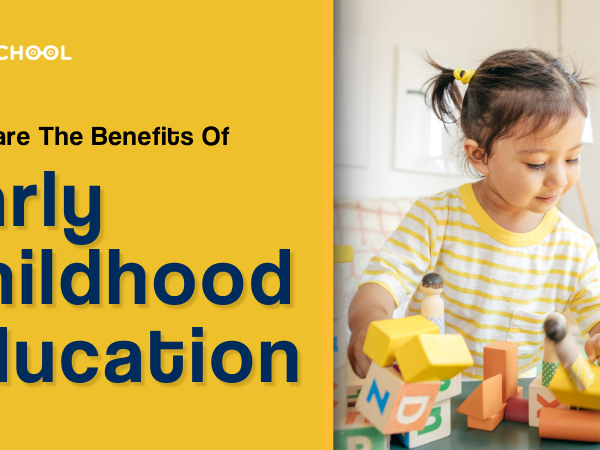Early childhood education (ECE) is a dynamic and transforming process that centers around a continual cycle of knowledge. It is a journey in which young minds engage, investigate, absorb, and apply knowledge in an endless circle of growth and development. In this comprehensive investigation, we will delve into the complicated cycle of knowledge in early childhood education, revealing how it impacts the intellectual, social, emotional, and physical components of a child’s development.
A Time of Tremendous Growth
Early childhood, which normally lasts from birth to roughly the age of eight, is a time of incredible growth and development. Children’s minds are like sponges during these formative years, avidly absorbing knowledge and experiences that will leave an everlasting impact on their future.
The Cycle of Knowledge in Early Childhood Education
The knowledge cycle in early childhood education is a multidimensional process with numerous interconnected stages. Let us investigate each stage of this cycle and its significance:
Engagement
The cycle begins with engagement. Children are naturally curious and eager to explore the world around them. Early childhood educators create environments that captivate children’s interest, sparking their curiosity and desire to learn. Engagement sets the stage for the entire knowledge cycle, as it ignites the initial spark of interest.
Exploration
Once engaged, children embark on a journey of exploration. They use their senses to investigate, observe, and interact with their surroundings. In this phase, children are like little scientists, conducting experiments and forming hypotheses about the world. They explore various materials, engage in play-based activities, and ask questions to satisfy their curiosity.
Absorption
As children explore, they absorb knowledge like sponges. This absorption occurs through observation, imitation, and interaction. Children learn from their experiences and from the guidance of educators, family members, and peers. It is during this phase that they acquire language, develop fine and gross motor skills, and grasp fundamental concepts.
Application
Once knowledge is absorbed, children naturally apply it to their daily lives. They experiment with newfound skills and information, putting them into practice. Application allows children to solidify their understanding and discover how the knowledge they’ve gained can be used to solve problems, express themselves, and engage with the world.
Reflection
Reflection is a crucial phase of the knowledge cycle. It involves thinking about what has been learned, making connections between experiences, and considering how new knowledge fits into existing frameworks. Reflection encourages critical thinking and metacognition—the ability to think about one’s own thinking.
Extension
In the extension phase, children build upon their existing knowledge. They take what they’ve learned and delve deeper into related concepts and skills. Educators facilitate this extension by providing opportunities for further exploration and challenging children to expand their understanding.
Assessment
Assessment is an ongoing and integral part of the knowledge cycle. It involves educators observing and documenting children’s progress, identifying areas where they excel and areas where they may need additional support. Assessment helps tailor instruction to individual needs and ensures that the learning environment is responsive to each child’s development.
Feedback and Adaptation
Feedback plays a vital role in the cycle of knowledge. Educators, parents, and peers provide feedback that reinforces positive behaviors and corrects misconceptions. This feedback loop informs educators’ strategies and allows for adaptation in teaching methods to better support children’s learning.
Also Read: How Do You Start Homeschooling For Your Child?
The Holistic Impact in Early Childhood Education
The knowledge cycle in early childhood education is not limited to cognitive development; it also has a significant impact on other elements of a child’s development:
Social Development :
Through exploration and application, children learn to interact with others, forming relationships and understanding social norms.
Emotional Development:
Reflecting on their experiences and applying knowledge helps children develop emotional intelligence, enabling them to identify and manage their feelings.
Physical Development:
Knowledge application often involves physical activities, promoting the development of fine and gross motor skills.
Conclusion
In early childhood education, the knowledge cycle is a never-ending path of engagement, discovery, absorption, application, reflection, extension, assessment, and adaptation. It is a dynamic and interrelated process that influences a child’s cognitive, social, emotional, and physical development. Early childhood educators play a critical role in fostering this cycle by providing environments that encourage inquiry and guiding children through each stage.
We recognize the importance of early childhood education in unleashing the potential of young minds and laying the groundwork for a lifetime of learning as we celebrate the delicate dance of knowledge. Know more – The Real School
FAQs
1. How can parents support the cycle of knowledge in early childhood education at home?
Ans: Parents can support their child’s learning by engaging in meaningful conversations, providing opportunities for exploration and play, reading together, and fostering a nurturing and inquisitive environment at home.
2. Are there specific teaching methods that align with the cycle of knowledge in early childhood education?
Ans: Yes, many teaching methods, such as play-based learning, inquiry-based learning, and Montessori education, align with the cycle of knowledge in early childhood education. These approaches emphasize engagement, exploration, and hands-on learning.
3. How does the cycle of knowledge impact a child’s later academic success?
Ans: The cycle of knowledge in early childhood education provides a strong foundation for later academic success. It cultivates critical thinking skills, a love for learning, and a solid understanding of fundamental concepts that children can build upon as they progress through their education.
4. What role do educators play in facilitating the cycle of knowledge in early childhood education?
Ans: Educators create environments that engage children’s curiosity, guide exploration, provide opportunities for application and reflection, and offer assessment and feedback. They adapt their teaching methods to support each child’s unique learning journey.
5. Is the cycle of knowledge limited to cognitive development, or does it impact other aspects of a child’s growth?
Ans: The cycle of knowledge in early childhood education has a holistic impact, influencing cognitive, social, emotional, and physical development. Through exploration and application, children learn to interact with others, develop emotional intelligence, and enhance their motor skills.







